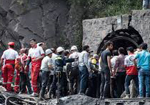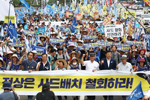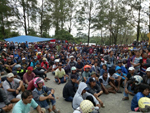|
|
|
|
|
Published 10 September 2017
|
 Over the last couple of weeks, the crisis in northern Rakhine State has become a humanitarian disaster with tens of thousands of Rohingya people fleeing the scorched earth policies of the Myanmar military. The Myanmar military has a long history of human rights abuses against ethnic minorities, but the latest offensive in Rakhine State is on an unprecedented scale. While supposedly a democracy, the Myanmar government, headed by Aung San Suu Kyi, has not changed its repressive policies against ethnic or religious minorities, or any opposition to its rule. Over the last couple of weeks, the crisis in northern Rakhine State has become a humanitarian disaster with tens of thousands of Rohingya people fleeing the scorched earth policies of the Myanmar military. The Myanmar military has a long history of human rights abuses against ethnic minorities, but the latest offensive in Rakhine State is on an unprecedented scale. While supposedly a democracy, the Myanmar government, headed by Aung San Suu Kyi, has not changed its repressive policies against ethnic or religious minorities, or any opposition to its rule.
|
|
|
|
|
|
|
|
|
|
Published 10 September 2017
|
 At the end of August, the Kazakhstanskaya coal mine in the Karaganda region, just south of the capital Astana, operated by ArcelorMittal Temirtau was rocked by a major explosion. The blast was caused by extremely high levels of methane gas. Three workers were killed while three others were seriously injured. This is not the first time that major incidents have occurred at this mine. Coal mining is a very hazardous industry worldwide as companies put profits above workers’ lives, (see here, here and here). In Kazakhstan, independent unions are also heavily repressed. At the end of August, the Kazakhstanskaya coal mine in the Karaganda region, just south of the capital Astana, operated by ArcelorMittal Temirtau was rocked by a major explosion. The blast was caused by extremely high levels of methane gas. Three workers were killed while three others were seriously injured. This is not the first time that major incidents have occurred at this mine. Coal mining is a very hazardous industry worldwide as companies put profits above workers’ lives, (see here, here and here). In Kazakhstan, independent unions are also heavily repressed.
|
|
|
|
|
|
|
|
|
|
Published 10 September 2017
|
 With the forces of the popular revolution exhausted after six years of war, the Syrian conflict is heading into a consolidation phase where all the major imperialist and reactionary players are aiming to define their areas of interests. The two main powers in the conflict, the USA and Russia, are increasingly trying to find a plan to ‘stabilise’ the region and give all the main players some areas of influence and control. Meanwhile, in the government controlled areas, reconstruction is now seen both as an economic opportunity to make super profits and a political opportunity to punish opposition areas. With the forces of the popular revolution exhausted after six years of war, the Syrian conflict is heading into a consolidation phase where all the major imperialist and reactionary players are aiming to define their areas of interests. The two main powers in the conflict, the USA and Russia, are increasingly trying to find a plan to ‘stabilise’ the region and give all the main players some areas of influence and control. Meanwhile, in the government controlled areas, reconstruction is now seen both as an economic opportunity to make super profits and a political opportunity to punish opposition areas.
|
|
|
|
|
|
|
|
|
|
Published 10 September 2017
|
 Earlier this week, labour activist Meng Han was released after almost 2 years in a Chinese jail. Meng had been working for the Panyu Workers’ Service Centre, a now dissolved labour rights group based in Guangzhou, and was convicted for supporting workers in their struggle against management. Authorities saw Meng as a serious threat having imprisoned him before in 2013. In his trial, Meng pleaded guilty after his immediate family came under pressure from authorities, and was handed the harshest sentence of his fellow co-accused. Earlier this week, labour activist Meng Han was released after almost 2 years in a Chinese jail. Meng had been working for the Panyu Workers’ Service Centre, a now dissolved labour rights group based in Guangzhou, and was convicted for supporting workers in their struggle against management. Authorities saw Meng as a serious threat having imprisoned him before in 2013. In his trial, Meng pleaded guilty after his immediate family came under pressure from authorities, and was handed the harshest sentence of his fellow co-accused.
|
|
|
|
|
|
|
|
|
|
Published 10 September 2017
|
 A four day strike by over 6,000 workers at the Tata Motors' Jamshedpur plant in north east India, ended with the workers winning secure employment for an extra 200 of their colleagues. Given that there are over 4,000 workers employed on insecure contracts, this arrangement is still unsatisfactory. That this strike began due to minor issues over pay discrepancies is an indication of the pressures that car workers are feeling in India. While there have been many struggles by car workers in recent years, the repression has also been savage (see here, here and here) A four day strike by over 6,000 workers at the Tata Motors' Jamshedpur plant in north east India, ended with the workers winning secure employment for an extra 200 of their colleagues. Given that there are over 4,000 workers employed on insecure contracts, this arrangement is still unsatisfactory. That this strike began due to minor issues over pay discrepancies is an indication of the pressures that car workers are feeling in India. While there have been many struggles by car workers in recent years, the repression has also been savage (see here, here and here)
Organising is a not a crime! Drop all the charges! Free all Maruti Suzuki, Pricol and Graziano workers
|
|
|
|
|
|
|
|
|
|
Published 10 September 2017
|
 It is 10 years since the Federal Government passed special legislation, known as the ‘NT Intervention’, which took control away from Aboriginal communities and allowed military personnel and police to take over their communities. The outcome of this take over has been further dispossession of Aboriginal people and a deterioration of their health and welfare status. A coalition of indigenous and non-indigenous people have come together to call for the immediate repeal of the intervention. In a related matter, a work scheme for unemployed Aboriginal people has also been a total failure, is racially discriminatory, and many people are forced into extreme poverty. It is 10 years since the Federal Government passed special legislation, known as the ‘NT Intervention’, which took control away from Aboriginal communities and allowed military personnel and police to take over their communities. The outcome of this take over has been further dispossession of Aboriginal people and a deterioration of their health and welfare status. A coalition of indigenous and non-indigenous people have come together to call for the immediate repeal of the intervention. In a related matter, a work scheme for unemployed Aboriginal people has also been a total failure, is racially discriminatory, and many people are forced into extreme poverty.
|
|
|
|
|
|
|
|
|
|
Published 10 September 2017
|
 This week, as tensions in the Korean peninsula remained high, the South Korea government proceeded with the deployment of further Terminal High Altitude Area Defense (THAAD) systems. Activists all around South Korea have been protesting for months against these deployments. To counter this last deployment, activists blockaded the main highway with vehicles and machinery. The government responded by deploying 8,000 police to confront the demonstrators and clear the way for the military vehicles (see here and here). This week, as tensions in the Korean peninsula remained high, the South Korea government proceeded with the deployment of further Terminal High Altitude Area Defense (THAAD) systems. Activists all around South Korea have been protesting for months against these deployments. To counter this last deployment, activists blockaded the main highway with vehicles and machinery. The government responded by deploying 8,000 police to confront the demonstrators and clear the way for the military vehicles (see here and here).
|
|
|
|
|
|
|
|
|
|
Published 3 September 2017
|
 This week, Gregory Dunn, an 88 year old Aboriginal man in northern Australia, died just days before he was due to tell his story to a Court about how the wages he earned working as a stockman had been stolen from him. His case is part of a landmark class action by 3,500 Indigenous Australians who are fighting the State government of Queensland for the wages they are owed over decades of work. The issue of Stolen Wages is a long running fight by Indigenous workers and solidarity labour activists, and is another example of the systematic dispossession and exploitation that Aboriginal people have endured since Australia was colonised in 1788. This week, Gregory Dunn, an 88 year old Aboriginal man in northern Australia, died just days before he was due to tell his story to a Court about how the wages he earned working as a stockman had been stolen from him. His case is part of a landmark class action by 3,500 Indigenous Australians who are fighting the State government of Queensland for the wages they are owed over decades of work. The issue of Stolen Wages is a long running fight by Indigenous workers and solidarity labour activists, and is another example of the systematic dispossession and exploitation that Aboriginal people have endured since Australia was colonised in 1788.
|
|
|
|
|
|
|
|
|
 This week many workers were injured at the giant Grasberg copper and gold mine in West Papua, owned by Freeport McMoran when police and security guards dispersed workers’ picket lines. This represents a further escalation of the current dispute that began in early May over possible job losses. In this time, the company has dismissed over 4,000 workers in an attempt to break workers’ commitment and solidarity. In industrial disputes involving global giants like Freeport McMoran, industrial action by workers in other Freeport McMoran mines around the world would be the most powerful actions to take. This week many workers were injured at the giant Grasberg copper and gold mine in West Papua, owned by Freeport McMoran when police and security guards dispersed workers’ picket lines. This represents a further escalation of the current dispute that began in early May over possible job losses. In this time, the company has dismissed over 4,000 workers in an attempt to break workers’ commitment and solidarity. In industrial disputes involving global giants like Freeport McMoran, industrial action by workers in other Freeport McMoran mines around the world would be the most powerful actions to take.
|
|
|
|
|

|






